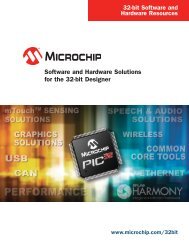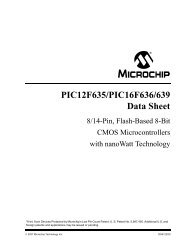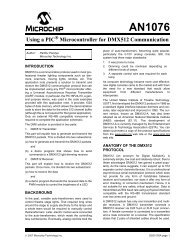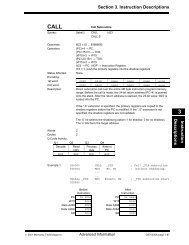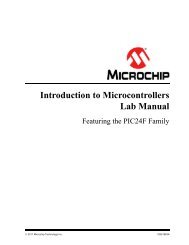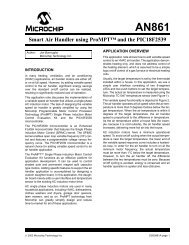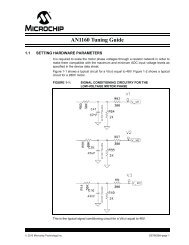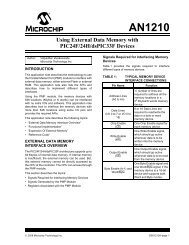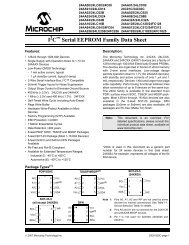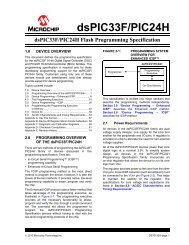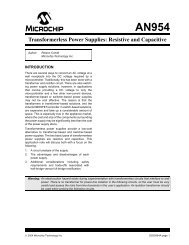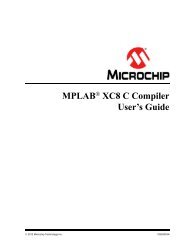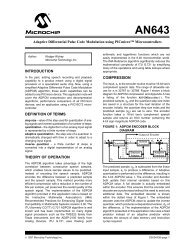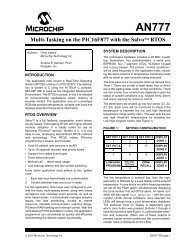MPLAB C Compiler for PIC24 MCUs and dsPIC DSCs ... - Microchip
MPLAB C Compiler for PIC24 MCUs and dsPIC DSCs ... - Microchip
MPLAB C Compiler for PIC24 MCUs and dsPIC DSCs ... - Microchip
You also want an ePaper? Increase the reach of your titles
YUMPU automatically turns print PDFs into web optimized ePapers that Google loves.
16-Bit C <strong>Compiler</strong> User’s Guide<br />
suggest hiding #directive from traditional C with an indented #<br />
The specified directive is not traditional C <strong>and</strong> may be ‘hidden’ by indenting the #.<br />
A directive is ignored unless its # is in column 1.<br />
suggest not using #elif in traditional C<br />
#elif should not be used in traditional K&R C.<br />
suggest parentheses around assignment used as truth value<br />
When assignments are used as truth values, they should be surrounded by<br />
parentheses, to make the intention clear to readers of the source program.<br />
suggest parentheses around + or - inside shift<br />
suggest parentheses around && within ||<br />
suggest parentheses around arithmetic in oper<strong>and</strong> of |<br />
suggest parentheses around comparison in oper<strong>and</strong> of |<br />
suggest parentheses around arithmetic in oper<strong>and</strong> of ^<br />
suggest parentheses around comparison in oper<strong>and</strong> of ^<br />
suggest parentheses around + or - in oper<strong>and</strong> of &<br />
suggest parentheses around comparison in oper<strong>and</strong> of &<br />
While operator precedence is well defined in C, sometimes a reader of an expression<br />
might be required to expend a few additional microseconds in comprehending the<br />
evaluation order of oper<strong>and</strong>s in an expression if the reader has to rely solely upon the<br />
precedence rules, without the aid of explicit parentheses. A case in point is the use of<br />
the ‘+’ or ‘-’ operator inside a shift. Many readers will be spared unnecessary ef<strong>for</strong>t if<br />
parentheses are use to clearly express the intent of the programmer, even though the<br />
intent is unambiguous to the programmer <strong>and</strong> to the compiler.<br />
T<br />
‘identifier’ takes only zero or two arguments<br />
Expecting zero or two arguments only.<br />
the meaning of ‘\a’ is different in traditional C<br />
When the -wtraditional option is used, the escape sequence ‘\a’ is not recognized<br />
as a meta-sequence: its value is just ‘a’. In non-traditional compilation, ‘\a’ represents<br />
the ASCII BEL character.<br />
the meaning of ‘\x’ is different in traditional C<br />
When the -wtraditional option is used, the escape sequence ‘\x’ is not recognized<br />
as a meta-sequence: its value is just ‘x’. In non-traditional compilation, ‘\x’ introduces<br />
a hexadecimal escape sequence.<br />
third argument of ‘identifier’ should probably be ‘char **’<br />
Expecting third argument of specified identifier to be of type ‘char **’.<br />
this function may return with or without a value<br />
All exit paths from non-void function should return an appropriate value. The compiler<br />
detected a case where a non-void function terminates, sometimes with <strong>and</strong> sometimes<br />
without an explicit return value. There<strong>for</strong>e, the return value might be unpredictable.<br />
this target machine does not have delayed branches<br />
The -fdelayed-branch option is not supported.<br />
too few arguments <strong>for</strong> <strong>for</strong>mat<br />
When checking the argument list of a call to printf, scanf, etc., the compiler found that<br />
the number of actual arguments was fewer than that required by the <strong>for</strong>mat string.<br />
DS51284H-page 198 © 2008 <strong>Microchip</strong> Technology Inc.



